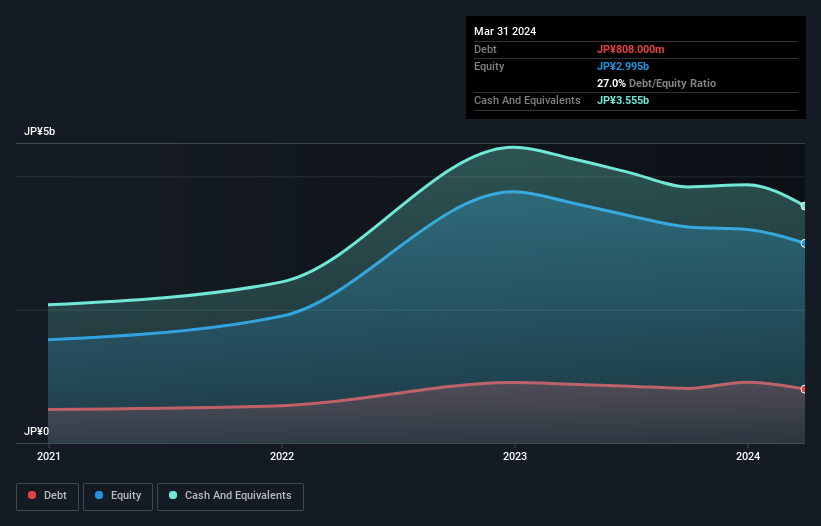
Legendary fund manager Li Lu (who Charlie Munger backed) once said, 'The biggest investment risk is not the volatility of prices, but whether you will suffer a permanent loss of capital.' When we think about how risky a company is, we always like to look at its use of debt, since debt overload can lead to ruin. We can see that Cyfuse Biomedical K.K. (TSE:4892) does use debt in its business. But is this debt a concern to shareholders?
When Is Debt Dangerous?
Debt assists a business until the business has trouble paying it off, either with new capital or with free cash flow. Part and parcel of capitalism is the process of 'creative destruction' where failed businesses are mercilessly liquidated by their bankers. However, a more usual (but still expensive) situation is where a company must dilute shareholders at a cheap share price simply to get debt under control. Having said that, the most common situation is where a company manages its debt reasonably well - and to its own advantage. When we think about a company's use of debt, we first look at cash and debt together.
Check out our latest analysis for Cyfuse Biomedical K.K
How Much Debt Does Cyfuse Biomedical K.K Carry?
As you can see below, Cyfuse Biomedical K.K had JP¥808.0m of debt at March 2024, down from JP¥880.0m a year prior. But on the other hand it also has JP¥3.56b in cash, leading to a JP¥2.75b net cash position.

A Look At Cyfuse Biomedical K.K's Liabilities
According to the last reported balance sheet, Cyfuse Biomedical K.K had liabilities of JP¥568.0m due within 12 months, and liabilities of JP¥340.0m due beyond 12 months. Offsetting this, it had JP¥3.56b in cash and JP¥53.0m in receivables that were due within 12 months. So it can boast JP¥2.70b more liquid assets than total liabilities.
This surplus liquidity suggests that Cyfuse Biomedical K.K's balance sheet could take a hit just as well as Homer Simpson's head can take a punch. With this in mind one could posit that its balance sheet means the company is able to handle some adversity. Succinctly put, Cyfuse Biomedical K.K boasts net cash, so it's fair to say it does not have a heavy debt load! The balance sheet is clearly the area to focus on when you are analysing debt. But it is Cyfuse Biomedical K.K's earnings that will influence how the balance sheet holds up in the future. So when considering debt, it's definitely worth looking at the earnings trend. Click here for an interactive snapshot.
Over 12 months, Cyfuse Biomedical K.K made a loss at the EBIT level, and saw its revenue drop to JP¥64m, which is a fall of 70%. To be frank that doesn't bode well.
So How Risky Is Cyfuse Biomedical K.K?
We have no doubt that loss making companies are, in general, riskier than profitable ones. And we do note that Cyfuse Biomedical K.K had an earnings before interest and tax (EBIT) loss, over the last year. Indeed, in that time it burnt through JP¥581m of cash and made a loss of JP¥645m. While this does make the company a bit risky, it's important to remember it has net cash of JP¥2.75b. That means it could keep spending at its current rate for more than two years. Overall, its balance sheet doesn't seem overly risky, at the moment, but we're always cautious until we see the positive free cash flow. When analysing debt levels, the balance sheet is the obvious place to start. However, not all investment risk resides within the balance sheet - far from it. These risks can be hard to spot. Every company has them, and we've spotted 3 warning signs for Cyfuse Biomedical K.K (of which 2 are significant!) you should know about.
At the end of the day, it's often better to focus on companies that are free from net debt. You can access our special list of such companies (all with a track record of profit growth). It's free.
New: AI Stock Screener & Alerts
Our new AI Stock Screener scans the market every day to uncover opportunities.
• Dividend Powerhouses (3%+ Yield)
• Undervalued Small Caps with Insider Buying
• High growth Tech and AI Companies
Or build your own from over 50 metrics.
Have feedback on this article? Concerned about the content? Get in touch with us directly. Alternatively, email editorial-team (at) simplywallst.com.
This article by Simply Wall St is general in nature. We provide commentary based on historical data and analyst forecasts only using an unbiased methodology and our articles are not intended to be financial advice. It does not constitute a recommendation to buy or sell any stock, and does not take account of your objectives, or your financial situation. We aim to bring you long-term focused analysis driven by fundamental data. Note that our analysis may not factor in the latest price-sensitive company announcements or qualitative material. Simply Wall St has no position in any stocks mentioned.
Have feedback on this article? Concerned about the content? Get in touch with us directly. Alternatively, email editorial-team@simplywallst.com
About TSE:4892
Cyfuse Biomedical K.K
Engages in the development, manufacture, and sale of regenerative medicine products in Japan.
Excellent balance sheet slight.


